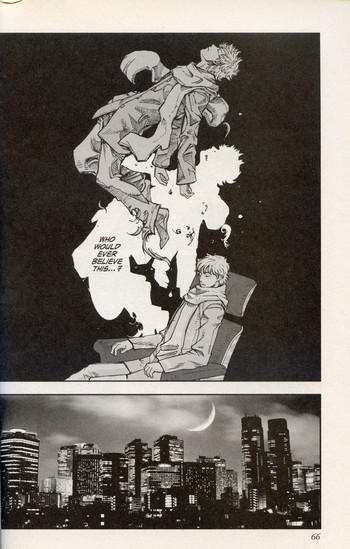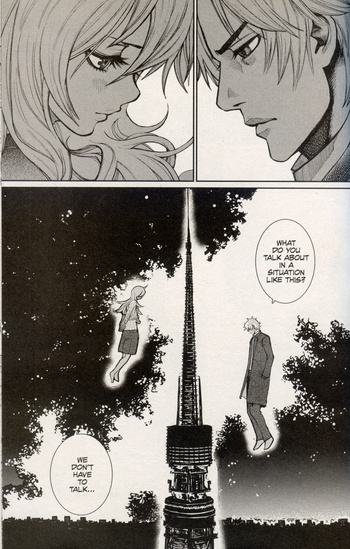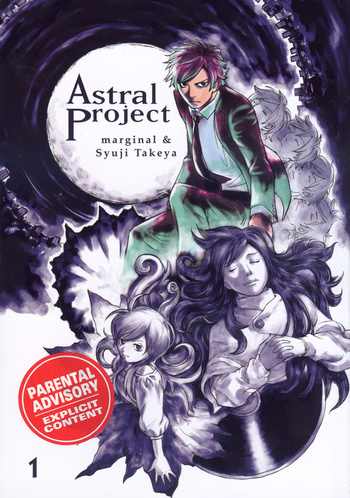House of 1000 Manga
Astral Project
by Shaenon K. Garrity,

“Why do you want to talk about Eurasian nomads?” begins one volume of Astral Project. Why not? This manga wants to talk about not only Eurasian nomads, but New Guinea natives, CIA-backed psychic experiments, obscure jazz musicians, the art of Francis Bacon, human-computer symbiosis, “transparent people,” and September 11. And, of course, astral projection. It's the Art Bell radio show in manga form. But in the end it's not about any of those things, and even the central paranormal mystery provides entry not to a higher plane of existence, but to life back home on Earth.
Our portal into the astral world is Masahiko, a cynical young guy who ran away from his abusive family and now works seedy yakuza-backed jobs as an escort driver. When Masahiko's withdrawn sister dies, he gets his hands on a CD she owned, an album of unfamiliar but powerful jazz music. And when Masahiko listens to the CD: “Some kind of weird vibration started up…and in the next instant I was looking down on my body!” Somehow, the music gives Masahiko the power of astral projection, and soon he's flying all over Japan in non-corporeal form.
At first, Masahiko is less interested in astral projection itself than in the hint it provides to his sister's fate. Could it be that she didn't die, per se, but simply left her body behind? In the airspace over Tokyo, he meets other astral projectors. Some are human: a teasing and mysterious girl who struggles to make ends meet in the mundane world, a homeless and hopeless alcoholic who appears as a wise guru on the astral plane. Others are creatures of the imagination, like Slimy-kun, a hulking monster who emerged from the mind of a video-game designer and took on a life of his own. On the astral plane, the borders between reality, fantasy, art, and the unconscious blur.
But instead of answering his questions, Masahiko's new paranormal friends raise more—countless more. The characters love to toss theories around, sending Masahiko on intellectual wild goose chases and explaining everything but the things he wants explained. (On Japan's loss of spiritual belief in the 20th century: “What do you think filled the gap? Maybe faith? Or worldly desires? PRO WRESTLING!”) Soon he's drawn into a web of fringe science and mysticism, conspiracy theories and psychic connections, a rabbit hole that seems capable of twisting deeper and deeper without end.

But the end does come. Astral Project is a short read at four volumes, which is probably about right for this material, although the abrupt ending suggests that writer marginal (a.k.a. Garon Tsuchiya) had plenty more plot to unravel before alt-seinen magazine Comic Beam cancelled the series. It was published in the U.S. by CMX, DC's late and lamented manga imprint, which often took a chance on not-quite-categorizable manga that other publishers probably considered too weird to touch. (Who else was going to license Moon Child? But seriously, publishers, somebody else pick up Moon Child. That manga is so dang good.) CMX couldn't even bank properly on Tsuchiya's semi-famous name, since he used one of his several pen names for Astral Project.
Still, maybe CMX thought it had a potential hit. On the surface, Astral Project is certainly marketable as an older-teen supernatural manga, with its broody main character and copious shots of busty women (mostly the escorts Masahiko drives around; our hero himself is asexual in the hardboiled, burned-out-on-dames style of a Mickey Spillane character). But then you actually read it, and you realize you're a million miles away from a typical psychic battle manga. Nobody in Astral Project uses their psychic powers to fight or carry out heroic missions. For Masahiko and the other central characters, astral projection turns out to be useful for one thing: hanging out with other astral projectors. It's like the login to an exclusive psychic chatroom. But for isolated souls craving meaningful connection, that's a more valuable ability than shooting mental blasts or summoning Stands.
Astral Project’s weakest feature is its art. It was one of the early professional jobs for artist Takeya Syuji, who does his best to imitate the gothic high style of Death Note, as more or less every seinen artist was doing in 2005, but doesn't come close. Syuji draws blocky, inorganic faces, and he switches up art styles and finishes so much that the characters sometimes seem to come from different planes of existence (which, come to think of it, would be a cool effect if he had enough control to make it a conscious choice). The art improves as the series goes on, and from time to time Syuji pulls off appropriately spooky set pieces. The most arresting visual is a simple one: a character from a painting comes to life on the astral plane, like they do, which Syuji depicts by simply pasting the figure into the artwork over and over. But a manga that takes place largely on a nigh-incomprehensible psychic plane needs an artist with the command and visual imagination to depict that world.

The manga's other major flaw is, as already mentioned, its abrupt ending. By the third or fourth volume, Masahiko's search for his sister has revealed an extensive conspiracy orchestrated by the U.S. government, which is trying to create astral projectors for espionage purposes. (Finally, a practical use for astral projection!) In a more typical manga, this would be the buildup to a climactic confrontation between Masahiko and the shady government agents who know the truth about his sister, and may even have access to her now-bodiless spirit. In this manga…not so much. Judging from the number of loose ends left hanging, it seems likely that Astral Project was simply cancelled before Tsuchiya planned to finish it. But even if it had continued beyond Volume 4, it probably wouldn't have ended with a satisfying catharsis. Tsuchiya isn't interested in confrontation, and, ultimately, he's not even interested in astral projection or the psychic plane or the dozens of weird paranormal ideas he throws into the mix every few pages. He's interested in the opportunity Masahiko and his fellow psychic travelers have to connect with each other on an earthly level.
Ultimately, unexpectedly, this outlandish manga set on the outer limits of paranormal paranoia is about mundane life. Masahiko gets to know the girl, Misa, and the homeless man, who calls himself Zampano, back on Earth. (Zampano mentions that he named himself after the cruel circus strongman in Fellini's La Strada; it's also the name of another obsessed and ruined old man in Mark Z. Danielewski's labyrinthine quasi-horror novel House of Leaves. And the connections reach ever outward.) All of them are wounded and uncertain, but they begin tentatively to build a family together. The manga spends as much space on the group's efforts to get Zampano a job and fix up Misa's hole-in-the-wall apartment as it spends on the CIA conspiracy. Gradually, the characters stop needing astral projection to talk to each other. And when that happens, do they need astral projection at all?
After weaving his massive web of weird factoids and tenuous connections, Tsuchiya leaves it waving in the breeze. After all this, the manga suggests, Masahiko's job is to sort through the information dump that astral projection has provided him and figure out what's really valuable. Is it meaningful that cult jazz legend Albert Ayler died on the same day nationalist author Yukio Mishima committed ritual seppuku? Maybe. Who cares? Is it meaningful that Zampano knew Misa's mother? Yes.
Tsuchiya is best known as the writer of Old Boy, which was adapted into one of the most infamous Korean revenge dramas. Compared to the darkness and brutality of Old Boy, Astral Project is surprisingly gentle. But both stories are, at the core, about isolated people desperate for human warmth in a cold and lonely modern world. In the end, most of the countless mysteries raised in Astral Project remain unanswered. For readers, this may be frustrating. But the characters don't care. They didn't find the truth out there, but they found what they needed. Other people can keep watching the skies.
discuss this in the forum (3 posts) |
